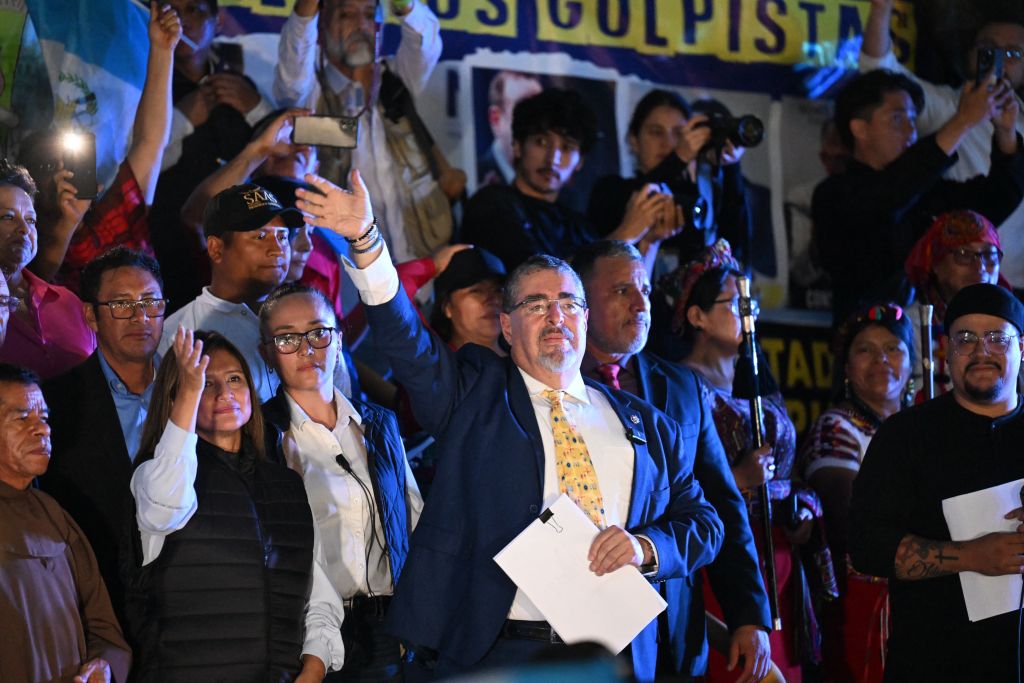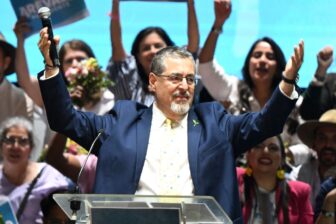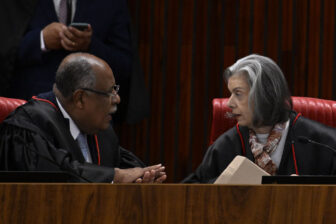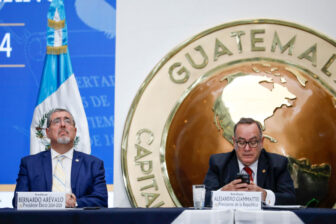They still haven’t given up: Parts of Guatemala’s political establishment continue to try to stop Bernardo Arévalo, who was democratically elected in August, from taking office on January 14. The recent raid of an electoral court highlights how coordinated domestic and international action will be needed in coming weeks to ensure nothing less than the survival of Guatemala’s democracy.
Arévalo’s promises to reduce corruption and resume meaningful anti-corruption investigations have generated strong pushback from a variety of undemocratic political and business interests seeking to maintain the status quo. Since virtually the moment Arévalo became a surprise candidate in Guatemala’s presidential runoff, they have tried to block him from assuming office or, failing that, to undermine his ability to govern by terminating his Semilla party’s legal status.
The Public Ministry (PM) is at the center of those efforts, led by Guatemalan Attorney General Consuelo Porras, whom the U.S. has sanctioned and placed on its Engels list of corrupt actors. On September 30, the PM raided the Supreme Electoral Tribunal (TSE) and removed—over the strident objections of TSE magistrates—boxes of certified vote counts as part of a supposed investigation into Semilla.
Arévalo was in Washington this week talking to a variety of pro-democracy actors, including U.S. Secretary of State Antony Blinken and National Security Adviser Jake Sullivan, trying to stop what he has rightly called a “slow-motion coup.” At an event I attended on Tuesday, Arévalo projected realism, confidence, humility, and faith in democracy and the rule of law. He pointed to his recent meeting with 200-plus newly elected mayors—of whom many are in the governing party—and said he sees a way to work with local authorities without engaging in the corrupt practices of the last several governments. He described how, despite Guatemala’s massive problems, the number of citizens who voted against the status quo reflects a tectonic shift in public attitudes that favors reforms.
So far, four factors seem to have kept Arévalo on a path toward inauguration, despite the forces attempting to undermine him. First, Arévalo’s own outstanding leadership and communications skills brought much of the public to his side, leading to his lopsided runoff election victory. Second, Guatemalans across the country, including several strong Indigenous groups—have organized massive, ongoing demonstrations and highway blockades to support Arévalo and show that they will not acquiescence to more of the same status quo politics.
Third, the international community stepped up with exceptionally strong statements. The U.S., the Organization of American States (OAS) and the European Union (EU) coordinated their responses, along with countries like Chile, Colombia and Costa Rica. The U.S. diplomatic effort was especially proactive, and featured forceful, private messages to various Guatemalan leaders about potential sanctions and the reputational consequences of continued democratic backsliding.
Fourth, all of this played into the refusal by key Guatemalan figures to go along with the Orwellian measures against Arévalo sought by the PM and the administration of President Alejandro Giammattei. Key members of the Constitutional Court, Supreme Court and Supreme Electoral Tribunal have stood firm. Meanwhile, groups representing the country’s economic elites—including CACIF, Fundesa and the Chamber of Commerce—have spoken out, at least publicly, against efforts to steal the election.
Yet dangers clearly persist. Giammattei presides over a Guatemalan state captured by what is commonly called a “pact of the corrupt”: a loose confederation of political leaders, economic elites, judicial operators and organized crime figures who cooperate for spoils and immunity from investigation. As president, Arévalo would face compromised institutions and a hostile, obstructionist Congress, but he still represents a serious threat to this illicit “smash-and-grab” system. Now, some of those involved are becoming desperate—and more dangerous.
To deter Giammattei and his circle from blocking Arévalo’s victory or hamstringing his government, and to peel away some of the judges, prosecutors and oligarchs who support this effort, the U.S. must back up its strong statements with equally strong actions. It needs to focus on individuals, not just institutions; on base emotions—the fear and greed that guide the “pact of the corrupt”—not just rational ideals.
Corrupt Guatemalan actors see the U.S. as a distracted paper tiger, too absorbed with issues like Ukraine to act forcefully against corruption in Central America. To change this perception, the U.S. must use Magnitsky sanctions to freeze assets—not just cancel visas—of anti-democratic judges and prosecutors, Giammattei’s political operators, and the oligarchs who bankroll them. This would splinter the “pact of the corrupt”; spur the oligarchy to reassess its support for it; and motivate politicians to accept democratic norms. It would also increase the credibility of potential U.S. actions against Giammattei himself after his term ends, as well as against his close friend Miguel Martínez. As a medium-term action, the U.S. should revamp its understaffed, under-resourced Department of Justice capability to investigate Guatemalan and Central American corruption. Progress on these fronts would help to improve stability and governance in Guatemala and therefore reduce migration to the U.S.
President Biden has rightfully called out corruption and democratic backsliding around the world. The presidential transition in Guatemala provides an opportunity to support a nearby nation whose people seek stronger democracy and transparency. Arévalo’s movement and Guatemala’s civil society have shown that they will continue their fight. If the U.S. takes action to match its rhetoric, it will strengthen their hand considerably. It will also encourage the international community to follow suit. Given the challenges ahead, robust international support could make all the difference.
—
McFarland (@AmbMcFarland) is a retired Foreign Service officer who was the U.S. Ambassador to Guatemala from 2008-11. Earlier, he served in El Salvador during its civil war. His career has focused on the Andean countries and Central America, in addition to Iraq and Afghanistan.








